Wednesday, November 26, 2025
DFM and ADX: Understanding the UAE’s Financial Market Landscape
By Century Financial in 'Blog'
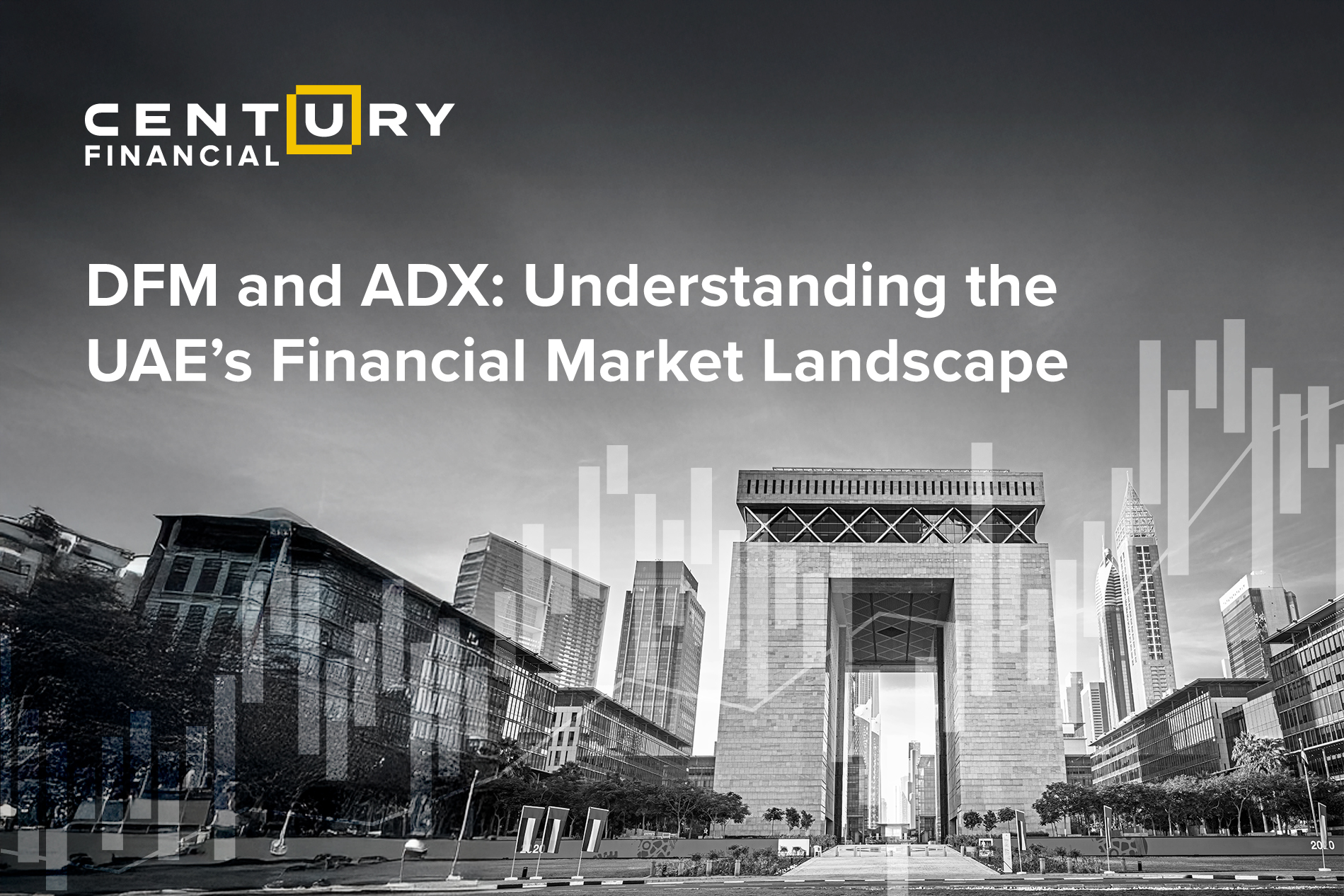
.jpg)
The Dubai Financial Market (DFM) and the Abu Dhabi Securities Exchange (ADX) are the foundational pillars of the United Arab Emirates' financial landscape. Since their founding in 2000, these exchanges have stimulated economic growth by offering a structured setting in which businesses can raise capital and investors can take part in the country's success. While both serve the UAE, they possess distinct characteristics, histories, and offerings that cater to different investment strategies.
Here, you will find a detailed and deep comparison of the DFM and ADX. We will explore their history, operational structure, key performance statistics, and the role they play in the regional economy. Furthermore, we will outline how you can begin investing in these markets, including the benefits and risks.
What is the Dubai Financial Market (DFM)?
The Securities and Commodities Authority (SCA) of the United Arab Emirates oversees the Dubai Financial Market (DFM), which is the main securities exchange in Dubai. As a Sharia-compliant exchange, it follows Islamic finance principles in both its operations and listed companies. This makes it a significant hub for Islamic financial instruments.
.jpg)
Since its launch, the DFM has been a fully electronic marketplace, connecting investors with a range of financial instruments, including equities, sukuk (Islamic bonds), and conventional bonds. In 2007, DFM became the first stock exchange in the Middle East to go public, listing its own shares on the exchange.
History and Milestones
The DFM was established on March 26, 2000. Its creation was a strategic initiative to deepen the UAE's capital markets and provide a formal platform for capital-raising and share-trading activities.
The exchange also launched single-stock futures on major companies, including Emaar Properties and Dubai Islamic Bank, expanding its derivatives market.
Key Statistics and Performance
The DFM has shown significant growth and resilience in recent years:
Market Capitalization:
Surged by 32% in 2024 to reach AED 907 billion, marking a decade-high milestone.
Index Growth:
DFM General Index climbed by 27.1% at the end of 2024, outpacing all regional peers and representing the largest annual gain in three years.
Daily Trading Value:
The average daily trading value reached AED 524 million in 2025, with a total traded value for the year of AED 133 billion.
Listed Companies:
Over 65 listed securities, with sector dominance in real estate, banking, and financial services.
Foreign Investment:
In 2024, DFM onboarded 138,262 new investors, of which 85% were foreign nationals. Foreign investors accounted for 50% of total trading value and held 21% of total market capitalization
IPO Activity:
In 2024, DFM conducted three highly successful initial public offerings (IPOs), raising AED 10.48 billion, including the listing of Talabat, which alone raised AED 7.5 billion, standing out as the world's largest tech IPO in 2024.
These numbers and consistent growth demonstrate DFM's appeal to both individual and institutional global investors.
What is the Abu Dhabi Securities Exchange (ADX)?
The Abu Dhabi Securities Exchange (ADX) is the official stock exchange of Abu Dhabi and operates under the SCA's regulatory framework. The ADX exchange has positioned itself as a hub for innovation, sustainability, and global collaboration, attracting participants from all over the world, both individuals and institutions.
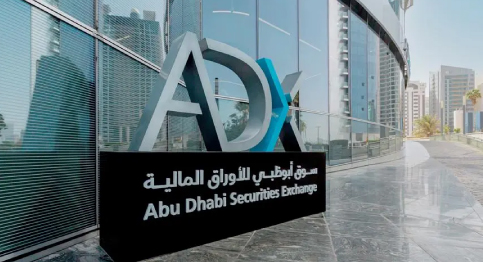
In 2021, ADX Abu Dhabi unveiled a new strategy called "ADX One," signaling its plan to enhance liquidity and expand its product offerings. This included the launch of a derivatives market in November 2021, starting with single-stock futures on major listed companies.
History and Milestones
ADX was founded on November 15, 2000, with the goal of offering a clear and effective way to trade securities. A key moment in its history was the launch of the "FADX 15" index in March 2022. This index tracks the performance of the top 15 most liquid and largest companies on the exchange, serving as a key benchmark for investors.
The ADX exchange has also been a pioneer in sustainability, joining the United Nations' Sustainable Stock Exchanges (SSE) initiative to promote environmental, social, and governance (ESG) reporting among its listed firms.
Key Statistics and Performance
The ADX has exhibited remarkable growth over the past years:
Market Capitalization:
Reached approximately AED 2.9 trillion, driven by major listings and rapid sector expansion.
Trading Activity:
The FTSE ADX General Index increased by 1.5% in September 2024, bouncing back after a short dip and continuing an upward trend in regional markets.
Daily Trading Volume:
The exchange regularly observes daily average trading values near AED 1.45 billion.
Listed Securities:
ADX hosts more than 90 listed securities, including leading names such as International Holding Company (IHC), Alpha Dhabi Holding, and First Abu Dhabi Bank (FAB).
IPO Activity:
The ADX has been a center for IPO momentum, with companies like ADNOC Gas and ADNOC Logistics & Services raising billions through high-profile listings, boosting capital inflows and market liquidity.
Comparing DFM and ADX: Key Differences
While both exchanges play crucial roles in the UAE's economic and capital market development, several distinctions make them appealing to different investor types:
Sector Focus:
The DFM's weight lies in real estate and financial services, while the ADX stock exchange offers broader sectoral exposure, particularly in industrials and investment holdings.
Investor Base:
DFM has witnessed a surge in foreign participation, with 85% of new investors in 2024 being non-UAE nationals. ADX attracts extensive institutional and international involvement due to its diverse listings.
Growth Performance:
DFM led the Gulf Cooperation Council (GCC) region with 27.1% annual index growth in 2024, making it the region's best-performing market.
Trading Patterns:
Both exchanges maintain substantial liquidity, but DFM saw total investor accounts increase by 120% year-on-year in 2024.
How to Invest in DFM and ADX Stocks
Accessing stocks, commodities, currencies, indices, and other ETPs on either exchange is a structured process. For any investor, the first step is to partner with a regulated brokerage firm.
Open a Brokerage Account:
Select a reputable and regulated stockbroker, such as Century Financial. This will be your gateway to the market.
Fund Your Account: To start investing, transfer money into your trading account.
Select an Exchange and Asset:
Decide whether you want to invest in a company listed on the DFM market or the ADX. You can research individual stocks, their financial performance, and growth prospects through the platform.
Place Your Order:
Once you have selected a stock, you can set your desired entry price and order size. The order will be sent to the appropriate exchange, and your broker will carry out the trade on your behalf.
Benefits of Trading on DFM and ADX
Investing in these UAE markets offers several compelling advantages, supported by statistical evidence:
Strong Regulatory Oversight: Both exchanges are regulated by the SCA, ensuring transparency and market integrity.
Tax-Free Environment: No UAE taxes on capital gains or dividends, boosting investor returns.
Direct Access to High-Growth Sectors: Investors gain access to world-leading companies across sectors such as logistics, finance, and technology.
Significant Liquidity: DFM stock exchange's daily trading value averaged AED 423 million in 2024; ADX's daily trading frequently exceeds AED 1 billion.
IPO Opportunities: The increasing scale and frequency of IPOs on both exchanges creates opportunities for trading, portfolio diversification, and growth.
Understanding the Risks
Participation in any stock market carries inherent risks. Prices are influenced by domestic and international economic events, shifts in investor sentiment, and geopolitical developments. For example, DFM and ADX, despite robust infrastructure, experienced market volatility reflected in index fluctuations—even as the DFM stock exchange outperformed the GCC region in 2024. Prudent diversification and ongoing research are crucial for effective risk management.
Investors should evaluate risk tolerance and seek professional advice or utilize advanced analytics to inform their market decisions.
Conclusion
The Dubai Financial Market and ADX Abu Dhabi are more than just marketplaces; they are dynamic engines of the UAE's economic vision. They offer a transparent and efficient environment for investors to participate in the growth of some of the most influential companies in the Middle East. In this dynamic market, you can customize your investment strategy to maximize your portfolio and reach your financial objectives by learning about the distinctive characteristics of each exchange and working with a reliable broker.
FAQs on DFM and ADX
Q1. What is the difference between DFM and ADX?
A: Both are primary stock exchanges in the UAE. DFM hosts a diverse mix of assets, including regional stocks and bonds, real estate, and service sector stocks. ADX has blue-chip listings and other common ETPs.
Q2: How can I invest in DFM and ADX stocks?
A: You can invest in their stocks and other assets through a reputable and trusted broker, such as Century Financial, which has been catering to global traders for over 35 years.
Q3: Which companies are listed on DFM and ADX?
A: Yes, both Dubai DFM and ADX Abu Dhabi welcome international participants, but ownership is subject to regional regulatory laws
Q4. What are the trading hours for DFM and ADX?
A: Both DFM and ADX's pre-opening session is from 9:30 AM to 10:00 AM GST. Trading is in session from 10:00 AM to 3:00 PM GST, from Monday to Friday.
Q5. Can I trade DFM and ADX shares online with Century Financial?
A: Absolutely! With Century, you can choose from either exchanges or other global exchanges like the NYSE. With worldwide exposure and top-notch platforms, we ensure you trade seamlessly.
Q6. Is ADX or DFM better for day trading?
A: Both exchanges offer strong trading potential. The choice ultimately depends on the chosen asset, strategy, and market outlook.
This marketing and educational content has been created by Century Financial Consultancy LLC (“Century”) for general information only. It does not constitute investment, legal, tax, or other professional advice, nor does it constitute a recommendation, offer, or solicitation to buy or sell any financial instrument. The material does not take into account your investment objectives, financial situation, or particular needs.
The opinions expressed by the hosts, speakers, or guests are their own and may change without notice. Information is based on sources we consider to be reliable; however, Century does not guarantee its accuracy, completeness, or timeliness and accepts no liability for any loss arising from reliance on this content.
Trading and investing involve significant risk, and losses may exceed initial deposits. Past performance is not indicative of future results. CFDs and other leveraged products are complex instruments that may not be suitable for all investors. Please ensure you understand how these products work, the associated risks, and seek independent professional advice if necessary.
Century is licensed and regulated by the UAE Capital Market Authority (CMA) under License Nos. 20200000028 and 301044.
Please refer to the full risk disclosure mentioned on our website.
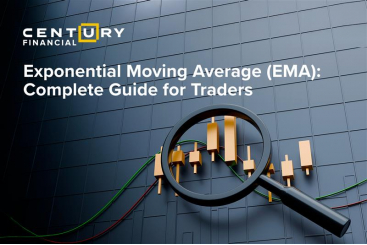
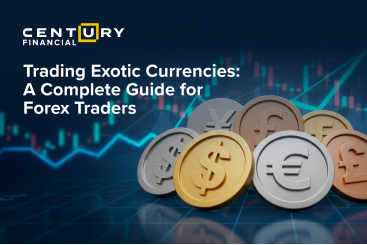
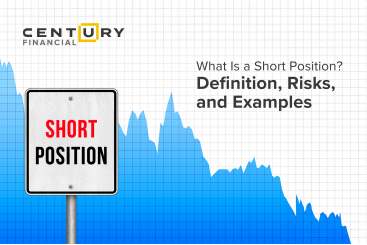

__1439480927.jpg)




.png)
.png)
.png)
.png)


